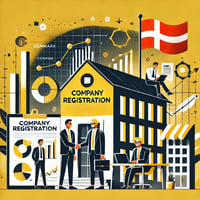
Steps to Set Up a Company:
Denmark
Choose a Business Structure
- Sole Proprietorship (Enkeltmandsvirksomhed): Single owner, full liability.
- General Partnership (I/S - Interessentskab): Two or more partners, shared liability.
- Limited Partnership (K/S - Kommanditselskab): General and limited partners.
- Private Limited Company (ApS - Anpartsselskab): Separate legal entity, limited liability.
- Public Limited Company (A/S - Aktieselskab): Separate legal entity, limited liability, suitable for larger businesses.
- Entrepreneurial Company (IVS - Iværksætterselskab): Simplified version of a private limited company, being phased out.
- Branch: A branch of a foreign company operating in Denmark.
- Representative Office: Limited to marketing and promotional activities, cannot conduct business transactions.
Register Your Company
- Choose a Company Name: Ensure it is unique and follows naming regulations.
- Prepare the Articles of Association: Outlining the company’s structure and rules.
- Register with the Danish Business Authority (Erhvervsstyrelsen): Submit the incorporation documents and pay the registration fee.
- Obtain a Central Business Registration (CVR) Number: For tax and business identification purposes.
Open a Danish Bank Account
- Set Up a Business Bank Account: Necessary for managing business finances.
Obtain Necessary Licenses and Permits
- Check Industry-Specific Requirements: Depending on the nature of your business, you may need specific licenses or permits.
Comply with Danish Employment Laws
- Employment Contracts: Draft contracts that comply with Danish labor laws.
- Register with the Danish Tax Agency (Skattestyrelsen): For tax withholding and social security purposes.
- Register with the Danish Customs and Tax Administration (Toldstyrelsen): If applicable.
- Health and Safety Regulations: Follow guidelines from the Danish Working Environment Authority (Arbejdstilsynet).
Accounting and Reporting
- Set Up an Accounting System: Maintain accurate financial records.
- Annual Financial Statements: Prepare and file annual financial statements.
- File Annual Tax Returns: Submit annual tax returns to the Danish Tax Agency.
Laws and Regulations to Consider
Corporate Law
- Danish Companies Act: Governs the formation and operation of companies.
- Partnership Act: Governs partnerships.
Tax Law
- Corporate Income Tax Act: Governs corporate income taxation.
- Value Added Tax (VAT) Act: Governs VAT regulations.
- Payroll Tax Act: Governs withholding and payment of payroll taxes.
Employment Law
- Danish Employment Contracts Act: Governs the terms and conditions of employment contracts.
- Danish Holiday Act: Governs employee vacation entitlements.
- Health and Safety at Work Act: Sets health and safety standards for workplaces.
Data Protection Law
- General Data Protection Regulation (GDPR): EU-wide regulation governing data protection and privacy.
- Danish Data Protection Act: National implementation of GDPR.
Environmental Law
- Environmental Protection Act: Governs environmental protection and sustainability practices.
Intellectual Property Law
- Trade Marks Act: Governs the protection of trademarks.
- Patents Act: Governs the protection of patents.
By following these steps and adhering to the relevant laws and regulations, you can successfully establish and operate a company in Denmark. It’s advisable to consult with legal and financial experts to ensure full compliance and smooth setup.
When to Consider Setting Up a Company in Denmark:
- Strategic Geographic Location: Denmark’s location provides access to markets in Scandinavia, Europe, and the Baltic region.
- EU Membership: As an EU member state, Denmark offers access to the EU single market and its benefits.
- Favorable Business Environment: Denmark consistently ranks high in ease of doing business and offers a supportive regulatory environment.
- Highly Skilled Workforce: Access to a highly educated and skilled labor pool, particularly in technology, engineering, and life sciences.
- Innovative Ecosystem: Denmark has a strong focus on innovation and technology, with numerous research institutions and tech hubs.
- Sustainable Practices: Denmark is a leader in sustainability and green technologies, providing opportunities for businesses in these sectors.
- Stable Economic Environment: Denmark offers a stable macroeconomic environment with low inflation and a strong currency.
- High Quality of Life: Denmark offers a high standard of living, excellent healthcare, and a favorable work-life balance, making it attractive for expatriates and international employees.
By considering these factors and aligning them with your business goals, you can determine if setting up a company in Denmark is the right move for your organization. Consulting with local experts and advisors can further help in making an informed decision.

Step-by-Step Guide: How to set up a Company
Setting up a company involves a series of crucial steps that require careful planning and execution. From choosing the right business structure to understanding legal and tax obligations, each stage is vital to the successful launch and operation of your business. This step-by-step guide provides a comprehensive overview of the key processes involved in establishing a company, ensuring you have the knowledge and tools needed to navigate the complexities of business formation.
